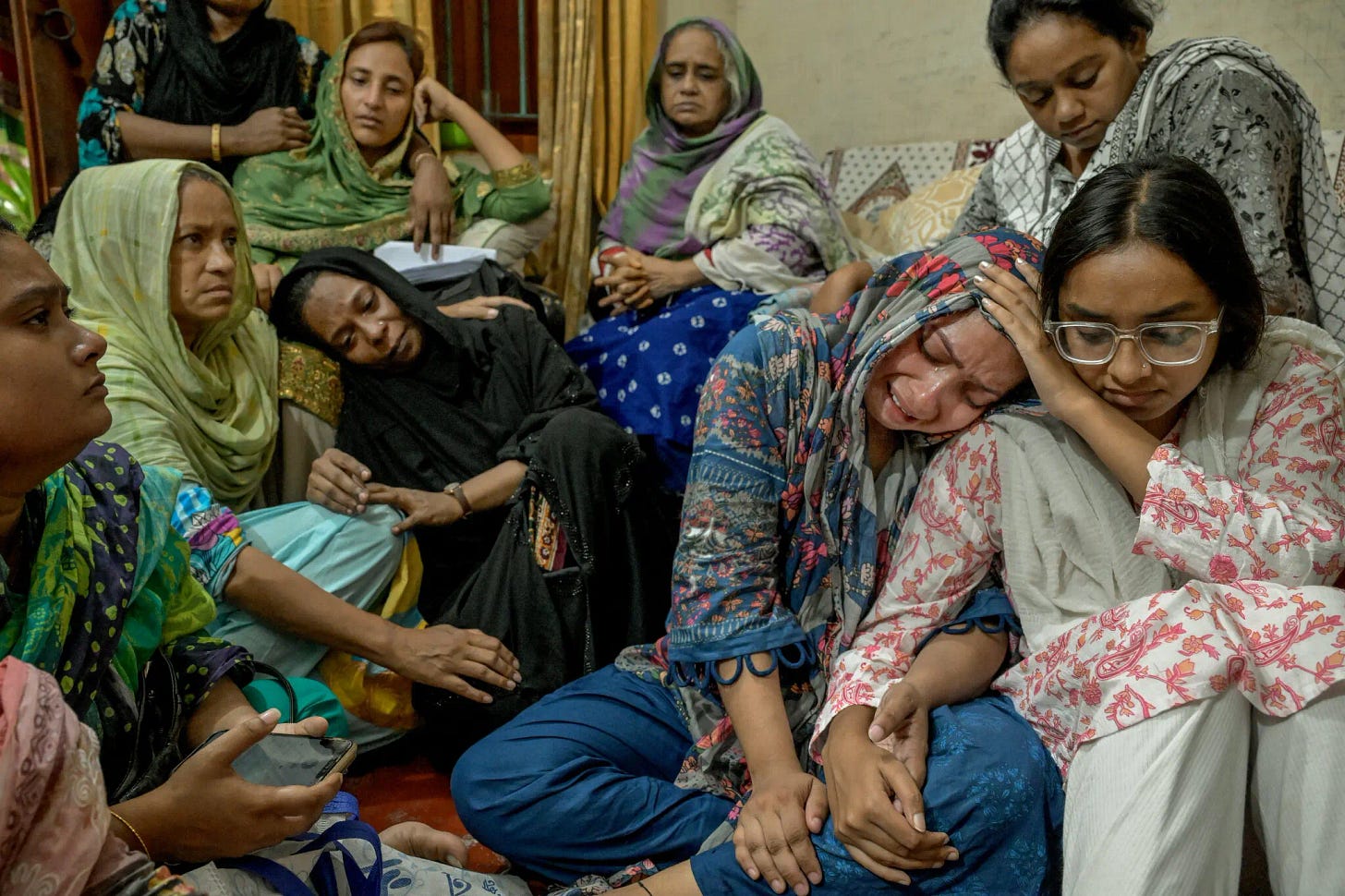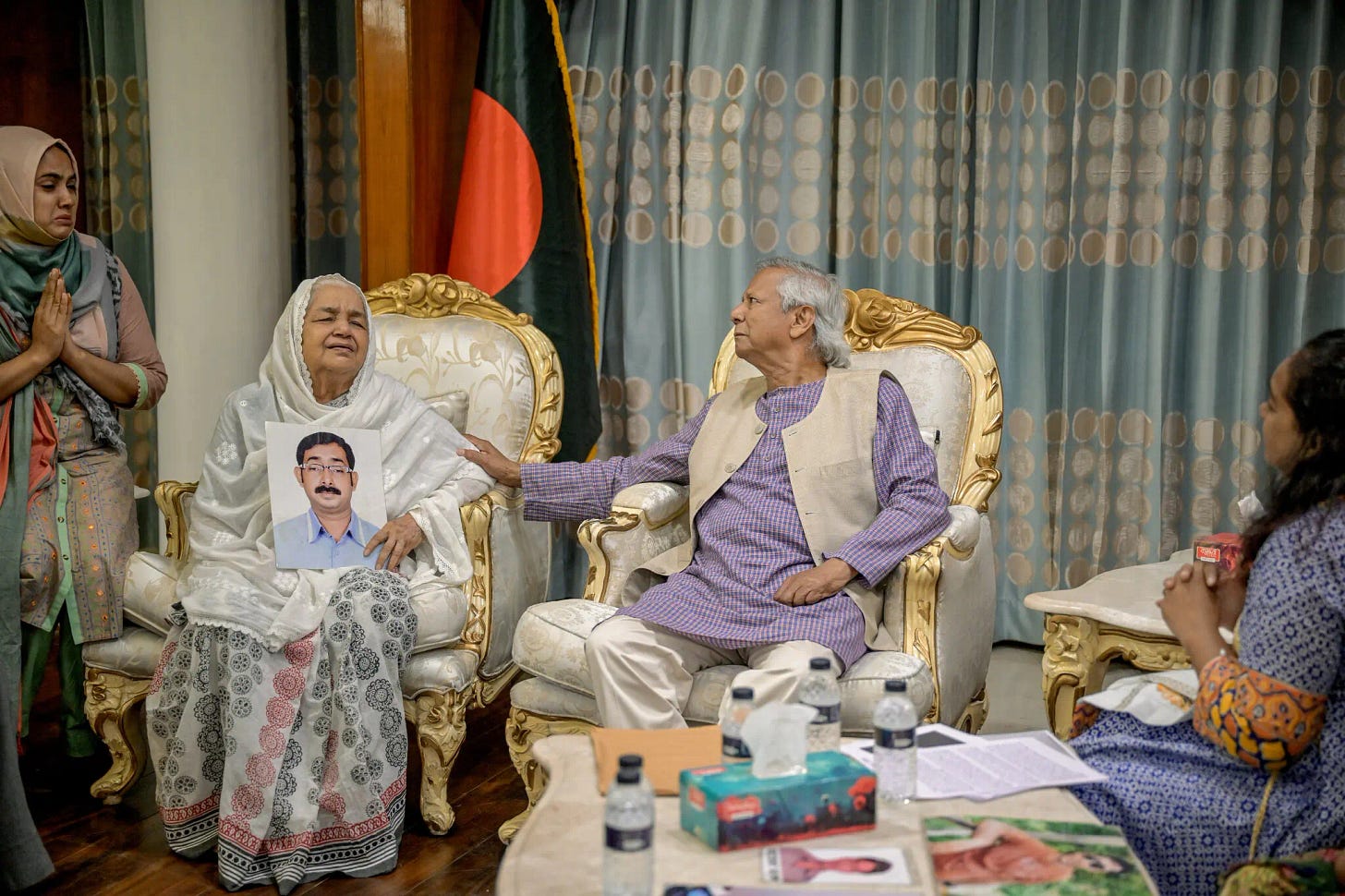Hasina’s House of Mirrors and The Reappeared

Author’s Note:
This article was originally published 20 October 2024, as part of a series of three articles on global affairs. This will be Part I of my republishing the series here, individually, as single articles.
Ahmad Quasem Arman was an attorney, with a wife and two young daughters, when in 2016 he was detained and disappeared by Bangladeshi paramilitary forces. For eight years, he remained blindfolded, in an underground, windowless cell, frail, unkept. Bangladeshi journalists in exile caught wind of the secret prison, in 2022, which they learned was code-named The House of Mirrors.9
Imagine Arman’s relief to find out that the wicked witch had been toppled. Arman was one of the several long-disappeared secret prisoners who were finally released as a result of “Sheikh” Hasina Wazed’s ouster from power back in August, after family members had been told the government knew nothing about the disappeared’s whereabouts. Apolitical himself, it’s believed he was targeted for his father’s sins who was am outspoken political activist and businessman, although by 2016 Hasina was disappearing anybody she didn’t like the look of.10
“I prayed to God every time that ‘I couldn’t be with my family in this world, at least keep us together in heaven,’” Mr. Arman, 40, told the Times.
It’s believed that hundreds were forcibly disappeared during Hasina’s 15-year rule, though that’s likely an underestimate. Simply attending an opposition rally or posting an unhappy Facebook thread was enough to get you locked up. Indeed, many young Bangladeshi’s still living in the country “lock” their Facebook profiles, essentially disallowing non-friends from seeing any content.
One of the many who’ve reappeared since Hasina’s ouster in August suffered “repeated strokes” after learning his wife had remarried, believing him dead. Another learned his father died after going door to door for years seeking clues to his disappearance. But dozens more have no been so “lucky,” with families being denied closure with not even remains of their loved ones turning up.
“In a particularly gruesome case, an official in Ms. Hasina’s party paid the battalion’s members to take out an adversary, according to court documents. When they went to pick the man up in broad daylight, they also rounded up any witness to the crime. The officers sedated seven people and strangled them, according to court testimony. To prepare the bodies to be dumped into a river, their abdomens were perforated to help them sink, and sacks of bricks were tied to them,” the NYT reports.
Seeing some like Arman reappear it gave hope to countless others who’d lost it all years prior. Tasnim Shipraa, whose uncle Belal Hossain vanished in 2013, said: “It’s almost like he never existed in this world.” It’s one thing to disappear one’s corpse, but it’s another to disappear their memory and their essence.
Abdullahil Amaan Azmi was another formerly disappeared person to reappear after Hasina’s ouster from The House of Mirrors. He’s described by the NYT as, “a decorated former army general who was whisked away apparently because his father had been a senior Islamist leader.” Hasina apparently believed in generational punishment, as she definitely believed in generational reward, using her dead father’s imprimatur to justify her lavish lifestyle and rule over Bangladesh as if it was a family business.

Azmi estimated he’d been blindfolded and handcuffed 41,000 times during his eight years in captivity. “I did not see God’s sky, the sun, the grass, the moon, the trees,” he said. Azmi’s only “exposure to sunlight” in the house of mirrors was a tiny hole in a vent that was discovered by his captors and swiftly shut. The only request he made was that his corpse not be befouled, returned to his family, with whom he so desperately hoped to be reunited, if only in death.
Maroof Zaman, a former ambassador, was disappeared for 15 months. He said he and the other prisoners knew they were at a military base not just because of “the discipline and precision of the guards,” as the Times put it, but also because they could “hear morning parades. They knew that officers’ residential quarters were close by, with normal life playing out just above them.” Every Friday “you could hear the children singing,” he said. Zaman was targeted because of his criticisms about Hasina’s corrupt relations with India, where she’s now hiding from justice.
“The pain — it never goes. The scar that is inside you,” Zaman said.
Michael Chakma, a tribal rights activist, was set free in a jungle in August after being driven blindfolded for hours, according to the Times. “It was the first time I saw daylight in five years,” Mr. Chakma said. “As I was seeing this, I was trying to double-check if I was just imagining this light or if it was real.” He was abducted in 2019 while entering a bank in Dhaka. He’d been campaigning for self-governance for Bangladesh’s Indigenous hill peoples, the Times reports.
Since the popular revolution that overthrew the Awami League-led government of Hasina Wazed, the families of the disappeared also took to the streets, joining vigils of the anti-quota students who were killed in the last days of the Hasina dictatorship. With the coming to power of an interim government, led by the student movement and the 84-year-old Nobel laureate, Professor Mohammad Yunus, families have been demanding and getting answers.

Professor Yunus’ government signed an international treaty on enforced disappearances and formed a committee to investigate the crimes in Bangladesh, in recent days. The committee has issues an arrest warrant for Hasina who, again, is hiding in India. Meeting with mothers seeking answers about their son’s whereabouts, Professor Yunus said to them that his government was a result of their protest. “Their persistence,” the Times wrote, for all those years had helped inspire the student protesters and others to rise up and topple Ms. Hasina.” If the country’s interim leaders cannot pursue justice for them, Mr. Yunus said, “then this government has no meaning.”
I surmised in my August article that the new government, led by the people who overthrew Hasina, had to create new forms of rule, including the replacing of the army and existing police, alongside mobilizing the country’s working-class to take over industry and foreign trade. Some signs of this happening have materialized. Professor Yunus said in recent weeks in an interview with German TV, his first since coming to power, that it’s likely the constitution must be rewritten, one of the proposals I’d made.
I’m glad to report that since then, I’ve connected with some of the student organizers and am in contact with Professor Yunus’ assistants. I’ve also noticed that students and government security continue protecting Hindu temples, which became opportunistic targets for mobs, during the most unstable period of this recent revolution. A notably beautiful event that occurred recently was the successful and safe holding of a large, annual Hindu festival in Bangladesh, their largest of the year.

Bangladesh is still a young country, and lots of growing pains are ahead of it. But it’s nevertheless heartening to see, at the moment, the interim government led by Professor Yunus at once doing what he can to protect Hindus in Bangladesh (a minority) while simultaneously holding the hands, and comforting the mothers and grandmothers, of those who were disappeared by Hasina’s death squads.
Hasina’s spoiled, big-mouth brat of a son—who’s bitter he’ll never assume her throne—continues to say his mother is ready to stand trial, even though Delhi has opted to “no comment” on Bangladesh’s arrest warrant. While I’m confident she’ll eventually be extradited, if she’s really as cocky as her spawn says, then she should turn herself in and face the people she maimed, tortured and ruined.




